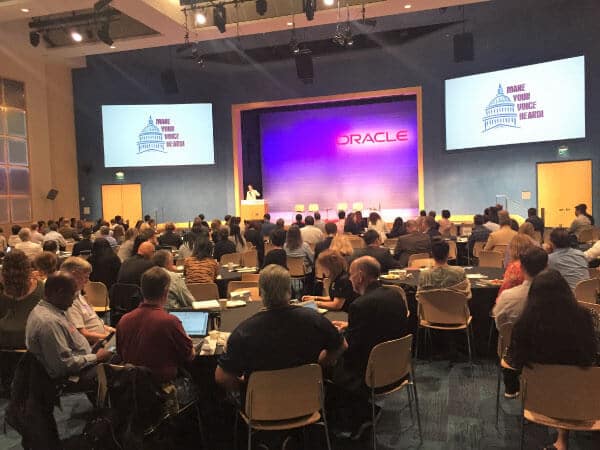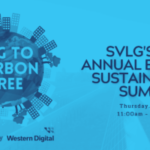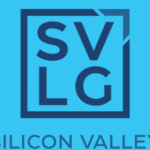The Leadership Group held its seventh annual Silicon Valley Energy & Sustainability Summit on June 14th at Oracle’s Conference Center in Redwood City, and the theme this year was “Catalyzing Transformational Leadership for Climate Action.” The day-long summit–branded #ESS19–brought together professionals from the private, public, and non-profit sectors to discuss how to more impactfully combat the climate crisis, adapt to the challenges being wrought by a changing climate, and become more resilient in the face of them.
Mike Mielke, Senior Vice President, Environment & Energy at the Leadership Group, kicked off the day by providing context and a case for why the private sector should take on a greater leadership role in responding to climate change. Oracle’s chief sustainability officer Jon Chorley then followed with his own take on how companies are incorporating environmental principles into their work.
The first plenary panel of #ESS19 focused on the state of the corporate sustainability profession, which increasingly helps drive innovation and informs corporate strategy. Moderated by sustainability recruiter Ellen Weinreb, the panel provided insights from Scott Broomfield of Sustainable Brands, Bruce Klafter of Flex, Katie Excoffier of Genentech, and Nicola Acutt of VMware. This panel was followed by a session centered around the latest policy sensation: the Green New Deal.
In a panel titled “Does California Have its Own Green New Deal?”, the discussion focused on how policymakers and business leaders can help ensure a just transition for workers currently employed by companies in the fossil fuel industry. Dan Chia from Tesla described the automaker’s initiatives to train a workforce reflective of California’s, while Kunal Merchant of CalOZ provided insight on how recent federal tax reform can be leveraged to drive investment into opportunity zones (OZs) and advance greater resiliency and sustainability of historically disadvantaged communities in California. Merchant suggested that branding such an initiative as the “Green Marshall Plan” would garner more bipartisan support than the Green New Deal has so far.
A keynote by acclaimed venture capitalist (VC) and former California State Controller Steve Westly later addressed the energy and environment policy landscape and lessons learned from cleantech investment. Mr. Westly asserted that global investment moved into clean energy several years ago, with power generation capacity additions from solar, wind, and other sources set to nearly double by 2030 to 279 Gigawatts (GW), relative to 143 GW in 2013. Electric vehicles are receiving the same sort of broad financial backing, especially with battery costs decreasing at such a quick rate. Another well-known VC, Nancy Pfund, and Mona Tierney-Lloyd of Enel X joined Westly on stage for the first of the summit’s “fireside chats.”
Before lunch, attendees took in one final talk by Patrick Flynn of Salesforce–a TEDx-style presentation on the “third mind” of corporate sustainability that examined how companies can better approach climate change as an issue. One specific suggestion was that companies should consider joining the Step Up coalition of companies–like Slack and HP–led by Salesforce. Among many urgent and hopeful calls to action, Flynn stated “We have a say in determining the future for all life as we know it…We must act fast and we must take big, bold, and scary steps. Moving slowly towards small goals isn’t an option–there will be irreparable damage.”
After lunch, Mike Mielke moderated the second fireside chat of the day, Advancing Resilience in an Era of Climate Disruption, with two key environmental leaders in California Governor Gavin Newsom’s administration–Wade Crowfoot, Secretary for the state’s Natural Resources Agency, and Kate Gordon, the Governor’s Senior Advisor on Climate and Office of Planning and Research Director. As part of the discussion, Gordon noted that companies face multiple climate risks–from sea level rise to fire zones to intense heat. She stated that asset-level risk analysis is critical in these warming times and that everything depends on where the company and its supply chains are located.
The final portion of the summit day featured two tracks of “breakout” panel sessions: Electrify Everything and Climate Resilience. While one track examined how to decarbonize buildings and transportation systems, the other focused on organizations’ work to better account for and address climate impacts as part of their corporate strategies. The panel sessions–two for each track–drew speakers from notable companies like Uber and Proterra; leading public agencies like the SF Mayor’s Office and SFO; and reputed non-profits such as The Greenlining Institute, SF Estuary Institute, and SPUR.
The sum of the event’s discussions and connections can help move Silicon Valley into an even stronger position of climate leadership. Laura Tam of SPUR emphasized this consensus at #ESS19, stating that everybody knows the climate is changing, and is ready to do something.
The devil of the challenge is in the details. The Leadership Group looks forward to engaging in policy and programmatic work, in partnership with the public and non-profit sectors, through 2019 and beyond to help drive the kind of change needed. Look for another edition of our Energy & Sustainability Summit next year! #ESS20
– Christophe LaBelle, Associate, Environment & Energy, Silicon Valley Leadership Group | July 11, 2019




